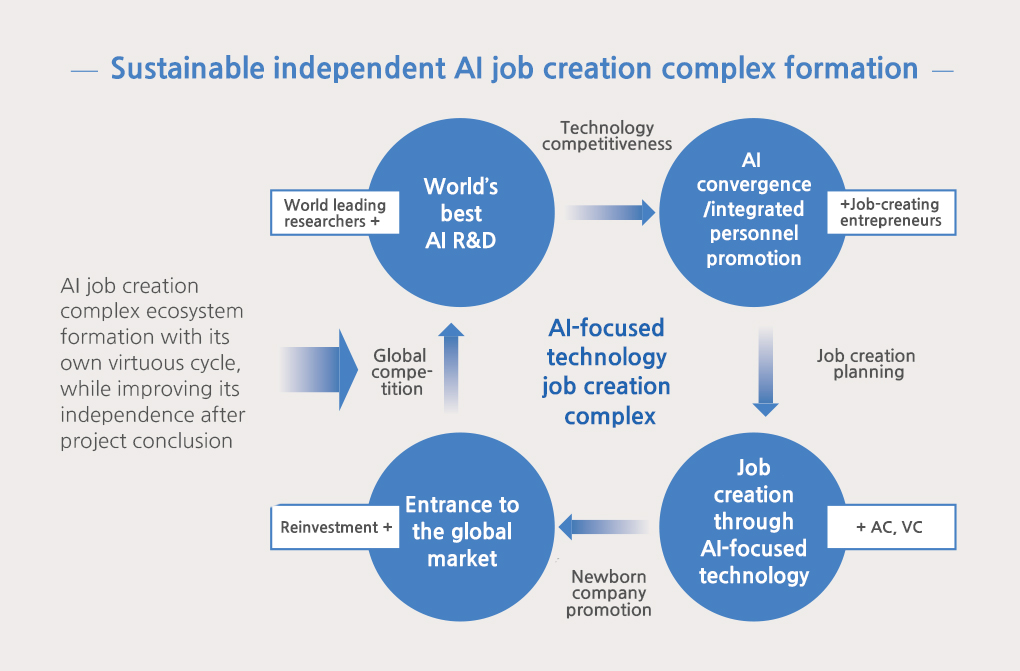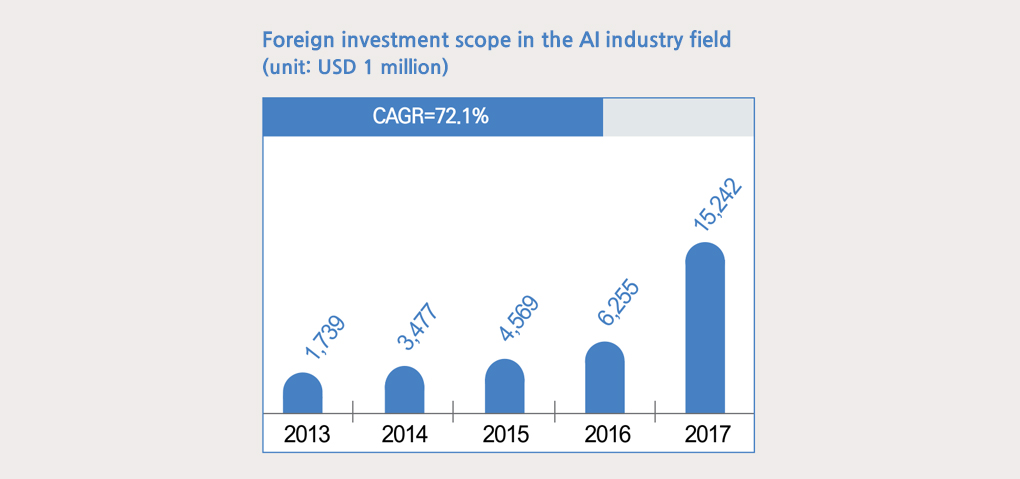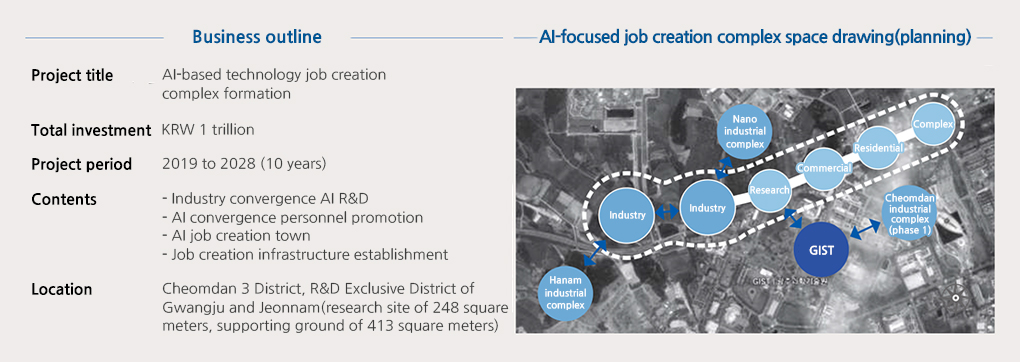Korea's first AI-based job creation complex is expected to be established in Gwangju with the purpose of developing AI
technology, the core strength of the 4th Industrial Revolution.
GIST has been chosen as the advance planning organization for this job creation complex that will be located in the Gwangju
Cheomdan 3 District. Being at the center of this project, GIST will lead the creation of new values derived from AI with excellent
research results and educational innovation.
The AI industry is at the center of future growth engines
Amid the rapid increase in global investment and demand for technology development regarding AI and its convergence with
existing industries, the establishment of a start-up complex for fostering the AI industry, which will become a future growth
engine, has been required.
Major developed countries are already moving rapidly and are making significant investments around existing AI industry
ecosystems. The United States will establish a professional research institute with the help of the government and academia to
actively develop AI technology with the support of $3 billion for 10 years starting in 2013 through the Brain Initiative Plan.
Japan established the AI Research Center to create a seamless cycle for AI development, commercialization, and convergence
research with support of 100 billion yen for 10 years starting in 2016. Korea plans to an AI-based start-up complex in Gwangju,
which is one of the 5-year government administration plans, and is in its final stages of implementation for 2019.
point 1
GIST creates AI-based start-up complex
This project is to form a 660,000 cubic meterthe AI-based start-up complex with in the Cheomdan 3 District next to GIST for
10 years from 2019 to 2028. Along with GIST, different industrial and educational institutes in Gwangju have joined including
Gwangju City, Gwangju Information & Culture Industry Promotion Agency, Korea Testing Laboratory, Gwangju Technopark, etc.
GIST, which is at the center of it, has been laying the groundwork for carrying out plans to create an AI-based start-up complex
over the past few years by increasing its AI-related research capabilities. It currently operates the GIST Artificial Intelligence
Center, SW Education Center and Intelligent Robot Center, along with 52 artificial intelligence-related professors and
researchers. In addition, GIST has actively participated in global AI research, including publishing 36 AI papers, carrying out 7.2
billion won worth of research tasks, and gaining 62 patents related to AI over the past five years, allowing GIST to have a
pivotal role in the creation of AI start-up complex. The ‘Maeil Business Newspaper-GIST forum’ was also held on July 11 at
GIST's Oryong Hall and various discussions were held about GIST's role in the development of AI technology under the theme
of 'Future Social Changes Caused by AI and GIST's Response.'
point 2
Synergy among research, education, and job creation for AI industry development
The ‘AI-based start-up complex is expected to have investment of total KRW 1 trillion and will have 3 major tasks: establishing
an AI research institute, creating an AI campus, and developing an AI industrial ecosystem. This is part of a bigger plan to
develop the AI industry through synergy among research, education, and job creation while harmonizing 3 different aspects by
establishing a domestic/foreign industrial and educational research cooperation system, creating an educational system
for promoting convergence personnel required for the 4th Industrial Revolution, and strengthening the capability of new AI
companies.
The AI research institute will be established as a large convergence research institute that differentiates itself from existing
universities and institutions with world-class artificial intelligence-based technology and will conduct research on core
technologies for corporate projects and the 4th Industrial Revolution.
For the AI campus, an AI specialized human resources curriculum will be implemented to train the convergence talent needed
for the 4th Industrial Revolution while the creation of an AI start-up ecosystem will serve as the basis for strengthening
corporate capabilities by building a start-up complex and enhancing global competitiveness

Another accomplishment expected for this project is that by creating a successful model of this AI-based start-up complex
in Korea, it would become a hub connected to other AI clusters in different regions. Starting with the AI-based start-up complex
in Gwangju, a national AI ecosystem can be actualized with specific cooperation among research, education, and job creation
promotion institutes in other regions such as Chungcheong and Gangwon. In addition, self-reliance measures for the
development of a sustainable AI start-up complex will be developed after the completion of the project to nurture AI
convergence talent based on world-class AI R&D technology and to promote trained talents in the global market through
the creation of AI technologies. Start-up companies with global competitiveness are expected to develop AI R&D with global
competitiveness, creating a virtuous AI-based start-up complex ecosystem.
point 3
The goal of creating the world's best AI-based start-up complex
There is a worldwide trend at the moment ato build strong industrial ecosystems that are focused on universities capable of
conducting researches in specific fields. If GIST's AI research and development capabilities are linked to major industries and
infrastructures in the region, it will be possible to find and foster future industries based on AI.
This project to create an AI R&D hub at GIST by establishing the AI-based start-up complex, AI campus, AI research institute,
and job creation center has the goal to make the world’s best AI-based start-up complex ecosystem, nurturing the core
personnel who can lead the R&D for the 4th Industrial Revolution and can lead the creation of business ecosystem.
The AI-based start-up complex is mainly located in Gwangju and Jeonnam, and it is expected to contribute by creating future
jobs through AI technology development, which is the core of 4th Industrial Revolution in Korea. We look forward to seeing the
city of Gwangju, which is making big plans to develop into a 4th Industrial Revolution convergence center, and GIST leading the development of the world's best AI technology at the center of this project.









